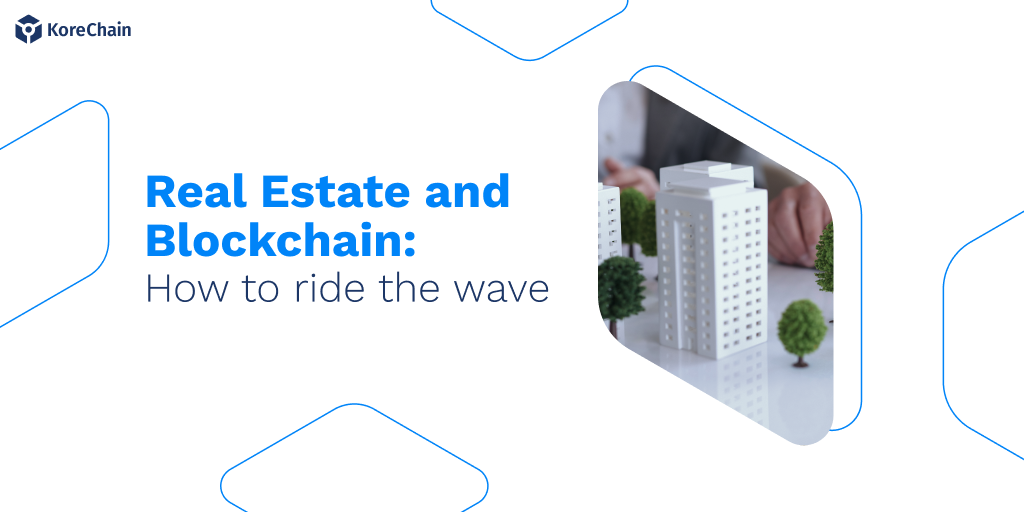Real Estate and Blockchain: beyond the hype
In the ever-evolving landscape of private capital markets, the intersection of real estate and blockchain technology presents an unprecedented opportunity for innovation and compliance. My goal today is to demystify the concept of real estate tokenization and outline how it can transform the sector in a way that is 100% compliant with regulatory frameworks, particularly the U.S. Securities and Exchange Commission (SEC). Through this exploration, we will delve into the mechanics of blockchain technology, the tokenization of assets, the JOBS Act, and the pivotal role of platforms like KoreChain in navigating these waters safely and effectively.
The Foundation of Real Estate Tokenization
The buzz around blockchain technology is well-founded, with its potential to revolutionize various sectors, real estate being one of the most promising. However, the term “revolution” might not fully capture the essence of what blockchain can do for real estate. Instead, I prefer to use “transformation.” This distinction is crucial because revolution implies “rip-and-replace”, while transformation implies a comprehensive improvement in processes, enhancing efficiency, security, and transparency for all parties involved.
Tokenization in real estate isn’t merely a novel method for raising capital; it represents a fundamental shift in how properties can be owned, managed, and invested in. By breaking down assets into digital tokens, blockchain technology offers a level of flexibility and accessibility previously unimaginable in the traditional real estate market.
Navigating the Regulatory Landscape
A pivotal aspect of implementing blockchain in real estate is adherence to regulatory standards. In the U.S., the JOBS Act has been a game-changer, offering a framework for crowdfunding and securities regulation that aligns perfectly with the ethos of blockchain tokenization. Regulations such as RegD 506(b) and 506(c) have opened the doors for raising capital with fewer constraints, provided that compliance with SEC guidelines is maintained. Furthermore, the introduction of Regulation A+ (RegA+) and Regulation Crowdfunding (RegCF) has significantly expanded the scope for who can invest and how much can be raised, democratizing investment in real estate projects.
The Role of KoreChain
Central to navigating these regulatory and technological complexities is the use of platforms like KoreChain. As a trusted partner in the realm of real estate tokenization, KoreChain facilitates the process of making offerings fully compliant with the SEC. From the initial stages of choosing the right blockchain technology to managing cap tables and engaging with investors, KoreChain and similar platforms are indispensable tools for real estate companies and sponsors looking to leverage blockchain technology.
Challenges and Solutions
Despite the promising horizon, the path to successful real estate tokenization is fraught with challenges, primarily stemming from a lack of understanding of the regulatory landscape and the technicalities of blockchain technology. Many ventures stumble not because of a lack of vision but due to a premature commitment to a specific blockchain or tokenization strategy without full consideration of the regulatory implications.
Educating and Empowering through Compliance
The key to overcoming these hurdles lies in education and strategic planning. Real estate companies must begin with a thorough understanding of the regulatory environment, particularly the nuances of the JOBS Act and SEC compliance. This foundation will not only dictate the choice of blockchain technology but also ensure that the process of raising capital is conducted efficiently and legally.
A Seven-Step Framework for Success
To assist real estate companies and sponsors in this journey, I propose a seven-step framework designed to streamline the tokenization process:
- Comprehensive Regulatory Review: Start with a deep dive into the JOBS Act regulations to understand which ones best fit your project.
- Technology Selection: Choose the blockchain technology that aligns with your regulatory strategy and business goals.
- Partner with Experts: Engage with trusted partners like KoreChain who can guide you through the complexities of compliance and technology implementation.
- Tokenization Strategy Development: Develop a clear strategy for how your real estate assets will be tokenized, considering factors like fractional ownership and investor accessibility.
- Investor Engagement Plan: Create a plan for engaging with potential investors, emphasizing transparency, and compliance.
- Cap Table Management: Implement robust technology solutions for managing your cap table and ensuring ongoing compliance.
- Continuous Education and Adaptation: Stay informed about regulatory and technological changes to adapt your strategy as necessary.
Embracing Change with Confidence in the relation between Real Estate and Blockchain
The fusion of real estate and blockchain through tokenization offers a future where investment is more accessible, transactions are transparent, and compliance is integral. The journey requires a blend of technological savvy, regulatory compliance, and strategic partnerships. By educating themselves and working with trusted advisors, real estate companies and sponsors can navigate this landscape confidently. Remember, the key to riding the wave of blockchain in real estate is not just about embracing new technology but doing so in a way that respects the regulatory framework and safeguards the interests of all stakeholders. In doing so, we can unlock the full potential of this transformative union.






 Back to Blog
Back to Blog